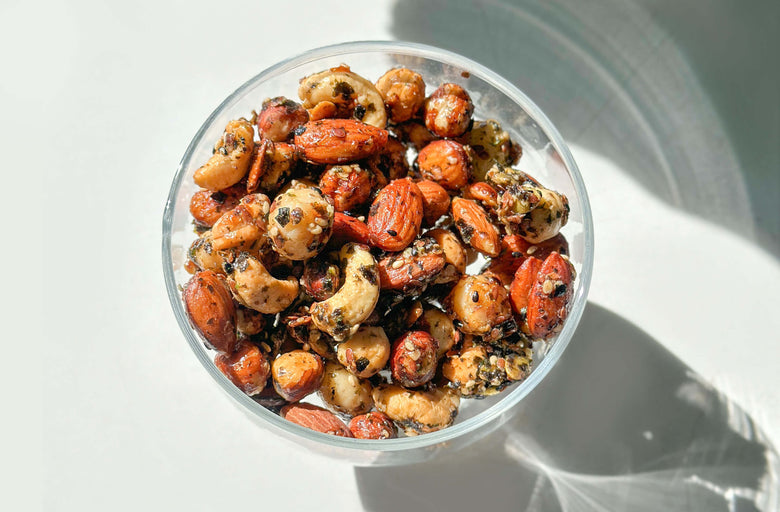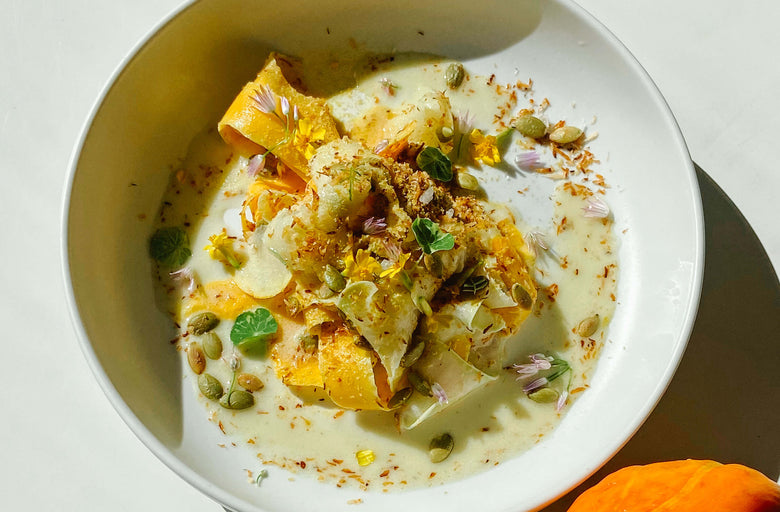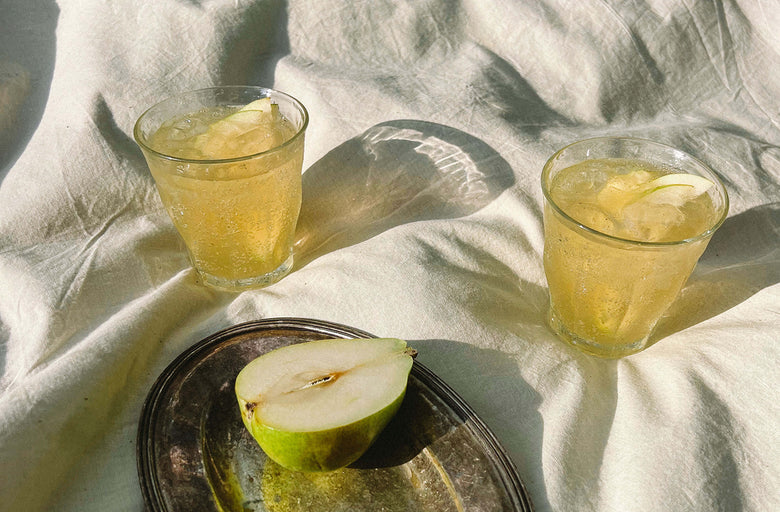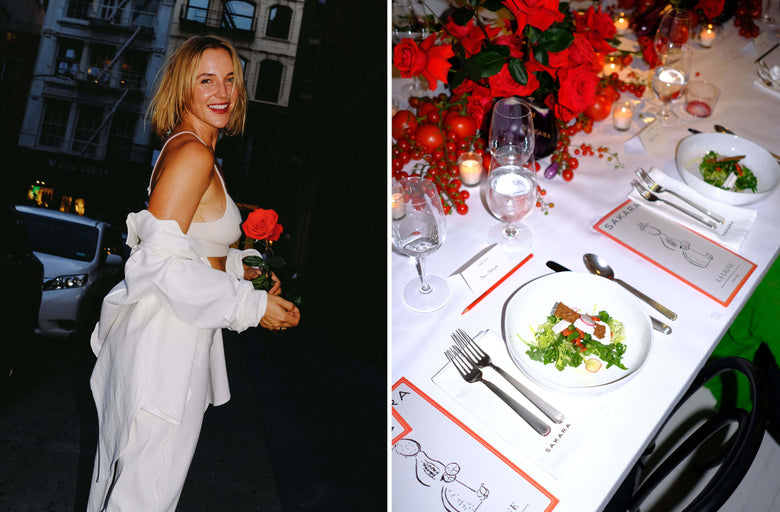Joe Holder goes beyond the physical. True, he’s got a body that appears to be chiseled from marble and trains legends like Naomi Campbell, but his training style is far more spiritual than surface. By way of his Instagram stories, you’ll find that he’s always engrossed in a stack of books relating to self-work, fitness philosophy, and rewiring our mindsets for greatness.
And when he’s not intellectualizing the human condition or in the gym conditioning fashion luminaries? He fuels this endless supply of energy through plants. He’s a proud member of what he’s dubbed the #plantbasedgang and lives on this powerful yin/yang wavelength— one that seems to embrace both high-octane workouts and complete sensory deprivation, a college football background and journaling about the Transcendentalist movement. We learned a lot from chatting with the Nike Master Trainer, New York Times contributor, Erewhon enthusiast, and world-class athlete.
Can you share your journey with us? Was holistic health always a part of your life?
I’m one of seven children. My dad was an internal medicine MD by trade with a bend towards holistic and integrative medicine in South Orange, New Jersey. My mother is an immigrant from Trinidad and wellness was always a part of her life. Her grandma was a “healer” in her local community and my mom made our nourishment a priority—cooking and juicing for us. She even grew her own wheatgrass. So, I’m not really new to this: the mix of education, medicine, and wellness was ingrained in me from a young age. Our yard was kind of the watering hole on the block, so my siblings and I would always have people over, getting into trouble and being active. It was quite the wave. I played three sports growing up—basketball, track, and football—the last of which I was relatively good at. I eventually went on to play college football at the University of Pennsylvania in Philadelphia.

You broke your leg at the height of your athletic career. How did it influence your eventual career as a trainer?
Trauma creates growth but I can’t say I was happy about it. I’m not one of those “everything has a purpose” people. I’m an adherent of Absurdist philosophy, so to an extent I don’t believe many things have an inherent value, you have to create the value. This position gives you much more autonomy, but also makes you take full responsibility for most things, so it’s a bit more difficult to handle day in and day out.
I had two moments in college that were life-altering. My sophomore year I hurt my ankle, a bad sprain that I tried to play on because I was hard-headed, and that eventually morphed into a stress fracture among other things. Doctors couldn’t tell me for over a year exactly what was wrong...Some told me I wouldn’t be able to play again, others were just baffled, and I had some coaches on my team who thought my injury was all in my head. It was an odd experience for me as I had played with a fractured wrist and broken pinky the year before and didn’t bat an eye. If anyone would play through the pain, it would be me.
I worked with my Dad and we realized that my healing process was stunted because of my mental state. I was depressed—school was hard, I was away from home, and this was the first “real” injury that had me miss substantial playing time, so this dysfunctional mental state would not allow my body to heal.
We started with a total revamp of my diet that also shifted to approaching my mental state, as well as general training activity. This was the origination of the Ocho System my overarching fitness philosophy (and Instagram handle).
I was finally able to heal my ankle, but then broke my right leg my senior year. Once again, I was distraught and doctors told me I would be out for the rest of the year. In my mind I had two choices: I could proactively deal with this head-on or I could sulk like I did a few years back with my ankle. I chose the former and went on what I considered a healing diet with mindfulness techniques and standard medical rehab practices to heal. Luckily, I was also young so it all worked out and I was back in about 4 weeks or so. From there I figured I was on to something.

When did being 100% plant-based enter your sphere and how did you make the switch? What were the biggest hurdles?
I started later in college and post-grad by slowly cutting out meat. I was just kind of tired of it, and wanted more nutrient-dense foods that wouldn’t make me tired. It wasn’t really wildly on purpose, but eventually I realized I wasn’t eating meat and didn’t want to go back.
To an extent, it’s about getting enough calories. The protein myth is overblown but athletic/active people do need a higher protein intake and there’s value in that, but not much value in saying you can’t get enough protein if you don’t eat meat. Athletes are a bit different as they’ll probably supplement to meet the needed requirements.
The biggest hurdle for me is honestly just eating enough. I’m always on the go and can run off of pure adrenaline so when I hit a wall and get tired it’s usually because I haven’t eaten. I will say it’s very important for people to monitor how they feel on any type of diet. Not eating meat isn’t for everyone and that’s fine, but eating more fruits and vegetables and fewer processed foods is definitely for everyone and that’s really what “Plant-Based Gang” is all about. You can be vegan and vegetarian and not be “Plant-Based Gang.” People forget this. PBG is about inclusion, not exclusion. If you’re not eating wholesome foods and only consume quote, unquote vegan "junk or processed foods", that’s not really PBG.
Can you take us through a typical day of eating as Joe Holder?
Wake up: A glass of room-temperature water or celery juice with lemon and ginger
Breakfast: Smoothie with red oak leaf lettuce, 10g of essential amino acids, 30g of pea protein, 1/2 cup of blueberries, 1/2 banana, 1 Tbsp. ashwagandha root, 1 tsp. chlorella, and 1 cup unsweetened almond milk or oat milk or water
Snack: Low-sugar fruit or handful of nuts
Lunch: Breakfast bowl from NYC restaurant Jack’s Wife Freda: red quinoa, pita bread, arugula, tomato, radish, and spaghetti squash
Snack: Smoothie with dandelion greens, hemp protein, acai berries, goji berries, blueberries, and unsweetened almond milk
Dinner: Sweet potato, curried chickpeas, broccoli, and Brussels sprouts
Late snack: Protein shake with pea and brown rice protein, arugula, almond butter, and BCAAs

You've developed a huge, impressive cult following. Why do you think you've been able to connect with so many people and why do you think they keep coming back?
I genuinely care about the people I work with and forge friendships. I don’t care that much about myself...almost to a fault. I played sports in college and have had my “alpha” moments so I’m not the type of person that works out incessantly or likes to glorify himself. I’m instead trying to find new ways to be better at my job so I can help my clients. At the end of the day, I work in a service industry. My job is to create and do things that work, and also allow people just to have a fun experience as they train. I also don’t really do classes, so I’m more of a coach. This is my craft and I take it seriously. I don’t take it for granted when people take an hour or two out of their day to come and see me and have an expectation of seeing goals achieved. Hopefully, I do well enough at my job to have them come back again.
How would you describe your training style?
A blend of performance and health modalities that at the end of the day, make sure I feel good. People are too interested in making things perfect or trying to do ridiculous movements for the sake of looking good on the internet. Focus on the basics, understand how to create your best workout recipe, and have distinct goals.

How has your athletic background shaped you? Can you explain the athletic mindset?
It has its pros and cons but athletics has absolutely shaped me. The athlete mindset definitely isn’t for everyone, but it stems from a few key things:
1.) Everything is done with a purpose. Athletes have no time to waste so frivolity is not part of the picture.
2.) Effort is cool, but results need to happen. The hardest worker isn’t always the best or smartest player. We laud effort in society when honestly, it’s all about who can get the job done. Athletes know this.
3.) “Strategic Laziness”. Athletes do what they should, not what it seems like they should be doing. Inaction is a form of action and athletes know which actions should be done and which shouldn’t, which saves time and energy and unnecessary wear and tear on the body.
4.) It starts with the mind. Athletes hone in on the connection between body and mind. We understand that one can have physical progress but that doesn’t lead to dominion and control over the body unless the mind is harnessed properly.
5.) The faster you become relevant the faster you become irrelevant. You never stop because your window is small. It could be an injury, a trade, other teams getting better. You keep perfecting your craft because the window could be small. Take advantage of every opportunity that comes your way and also take the time to understand what you can improve.
6.) Introspection is hard but key. Film watching and reviewing games was always the hardest part of playing sports because as much as we want to tell ourselves it wasn’t our fault, the camera never lies. This teaches you to take ownership and fix mistakes before they become larger issues.
7.) You can’t do it alone but it still comes down to you. Athletes have coaches, training staff, tutors—if you’re part of a team you know one can’t do it alone. However, when it comes down to it, the quarterback still has to make the throw, the receiver has to catch, the lineman has to block. It still comes down to your individual actions to make the efforts of the team complete and worthwhile.
We've read that you're really into regeneration. What are the ways in which you combat the stresses of modern life?
I don’t think humans are made for this constant bombardment of stimuli, so you have to find ways to deal with recovery appropriately, through both body and mind. It starts with food in my opinion. Food and sleep are the best healing options out there.

You are clearly interested in academic pursuits and strengthening the mind as powerfully as the body. What are you currently listening to, reading, following?
Anything that’s really helped me with taming my mind has assisted me. I don’t really follow or find inspiration from people within the fitness vertical. It helps to keep a pulse on what’s going on, but in terms of inspiration, I feel like that’s how you go stale. “Best practices become obsolete if everyone is doing them”, is one of my favorite sayings that I’m a firm believer in. I look more toward the sport and performance/science vertical than anything else. I’m a big proponent of Twitter and that’s often where I fall down rabbit holes that lead to various publications where I find quality information.
My library is stacked with books I have yet to read. I’m working on finishing Shoe Dog which stays on brand with my Nike ethos.
I typically look at my friends for inspiration. They’re amazing and often at top of their field so I’m the annoying little brother who is always watching in the corner. Food, performance, fashion, non-profit sector really get me going. Seeing what resonates across all fields helps me understand what human beings desire overall and then I can better understand how to apply that to my distinct discipline but if I only look at what’s happening in my field, it’s easy to live in an echo chamber and never level up.
What are your favorite places in New York City for wellness?
I typically like to work out by myself at any gym I have access to. I’m a big fan of Elizabeth Street garden. The energy of New York can be slightly overwhelming for me so I like any green space for a brief respite to calm me down. Madhufalla on Mulberry is my favorite smoothie spot. I also love saunas, massage, and myofascial acupuncture.

When you think of legacy, what is your greater vision for yourself and some goals you have yet to accomplish?
The goals I have for the world of wellness will not be achieved in my lifetime and I’m OK with that. If your goals are the size in which they can be achieved while you’re alive, then dream bigger. I want people to understand that wellness is not a capitalistic and affluent buzzword, even though the culture at large currently is trying to make it that way. Wellness is a way to free yourself from a society that doesn’t deem your health as the first priority. My goal is to help people understand that taking control of their health is the first step towards self-actualization and reclaiming personal autonomy. Once this is achieved we can, as a collective unit, start to take the correct steps to truly make society both meritocratic and democratic. The goals I need to accomplish include creating the necessary infrastructure, both online and offline, where I can assist people in meeting their health goals so they can fully embark on their journey towards self-actualization.






